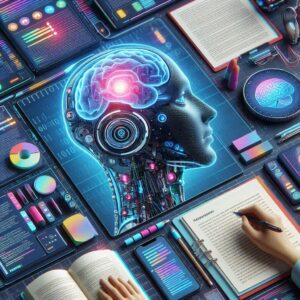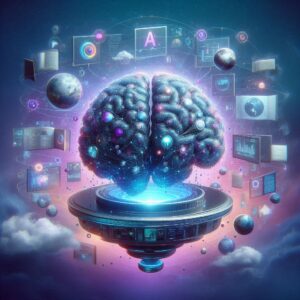Unlocking the Full Potential of AI for Dynamic Content Creation: Merging Automation with Human Creativity
The field of AI-driven content creation is undergoing a significant transformation, dramatically changing our interaction with digital platforms and media. With the advent of sophisticated artificial intelligence (AI) tools, their influence in shaping effective content strategies is becoming more critical than ever. These state-of-the-art technologies have redefined our methods of writing, editing, and distributing content, automating repetitive tasks while enhancing our operational efficiencies. By optimizing workflows for generating captivating blog posts and engaging social media content, AI empowers us to reach unprecedented productivity levels and foster deeper interactions with our audiences, fundamentally revolutionizing our connections with target markets.
This technological progress is especially beneficial for businesses and content creators who grapple with the necessity of consistently producing high-quality content. By leveraging AI's capabilities effectively, we can reclaim precious time and resources, enabling us to concentrate on strategic priorities while maintaining a steady stream of compelling content. However, as we weave these advanced technologies into our processes, it’s essential to critically assess the implications of heavy reliance on AI for content creation, particularly concerning quality and authenticity.
While automation can significantly bolster efficiency, it raises pressing discussions about authenticity, content quality, and the ethical dilemmas associated with AI usage. The challenge lies in striking the right balance between harnessing AI’s capabilities and preserving the unique voice and core values that define our brands. As we traverse the intricate landscape of AI-enhanced content creation, it is vital to weigh both the advantages and the potential drawbacks of this innovative approach.
Essential Insights for Maximizing AI-Enhanced Content Creation
- AI-enhanced content creation fundamentally revolutionizes our production techniques, resulting in faster and more streamlined workflows.
- Automation plays a crucial role in content generation, minimizing manual efforts while significantly enhancing overall productivity.
- Maintaining authenticity in AI-generated content is essential for building genuine connections with audiences and ensuring alignment with the brand's unique identity and core values.
- Key ethical considerations in AI-driven content creation include data privacy, algorithmic bias, and the potential ramifications for employment within the content industry.
- Finding the right equilibrium between automation and human creativity is vital for optimizing AI’s advantages while ensuring emotional intelligence and innovative thought are prioritized.
 Transforming Content Creation Strategies with Automation and AI
Transforming Content Creation Strategies with Automation and AI
The rise of automation has significantly reshaped our methodologies for both creating and distributing content, allowing us to address time-intensive tasks with remarkable speed and precision. Advanced technologies, including natural language processing (NLP) and cutting-edge machine learning algorithms, facilitate the swift production of written material. For instance, innovative platforms like OpenAI's GPT-4o can quickly produce cohesive articles, concise summaries, and creative narratives in just moments, substantially enhancing our productivity levels.
This incredible capability not only saves us invaluable time but also allows us to scale our content production efforts exponentially. By automating routine activities such as keyword analysis, performance tracking, and social media management, we can shift our focus toward crafting compelling narratives that resonate with our target audience. However, despite the many advantages that automation presents, it is crucial to remain aware of its limitations and potential pitfalls.
While AI can generate vast amounts of content, it often lacks the nuanced understanding of human emotions and cultural contexts essential for producing genuinely engaging materials. As we grow more dependent on automated systems, there is a risk that our content may become formulaic or overly generic, detracting from the unique essence that constitutes our brand's identity. Thus, it is vital to strike a careful balance between utilizing automation for improved efficiency and preserving the authenticity and relatability of our content.
Upholding Brand Integrity in AI-Generated Content
One of the most pressing challenges presented by AI-driven content creation is the preservation of authenticity. As we increasingly rely on AI tools for content generation, there exists a genuine risk that our brand's unique voice and core values may be overshadowed or diluted. For example, brands that depend excessively on automated content may unintentionally generate outputs that come across as mechanical or devoid of the emotional connection that consumers crave.
The potential loss of authenticity can create a rift between the brand and its audience, undermining trust and engagement. To mitigate this issue, it is essential to prioritize human oversight throughout the content creation process. Involving skilled writers and editors in the refinement of AI-generated content ensures that the final outputs resonate with our brand's tone and messaging.
This collaborative approach allows us to harness the efficiency of AI while protecting the authenticity that sets our brand apart in a crowded marketplace. Furthermore, training AI systems to comprehend specific brand language and values can empower them to produce content that resonates deeply with our target audience. By implementing these proactive strategies, we can attain a harmonious balance between automation and authenticity, ensuring our content reflects our brand identity.
 Navigating Ethical Considerations in AI-Driven Content Creation
Navigating Ethical Considerations in AI-Driven Content Creation
As we embrace AI technologies in content creation, it is crucial to address the various ethical dilemmas that arise from their application. A primary concern involves the risks of plagiarism and the spread of misinformation associated with AI-generated outputs. Given that AI systems are trained on extensive datasets that may encompass copyrighted materials or biased information, there exists a risk of unintentional duplication or dissemination of inaccuracies.
This scenario not only poses legal challenges but also undermines the integrity of our brands and the trust we cultivate with our audiences. Additionally, biases embedded within training data can lead to misrepresentation in AI-generated content. If we neglect to actively address these biases, we risk perpetuating stereotypes or marginalizing voices within our narratives, ultimately harming our brand's reputation.
To effectively navigate these ethical complexities, we must establish comprehensive guidelines for the responsible use of AI in content creation. This encompasses conducting thorough audits of training data, ensuring transparency in our processes, and nurturing a culture of accountability within our teams. By prioritizing ethical considerations, we can capitalize on AI's transformative potential while remaining steadfast in our commitment to integrity and social responsibility.
Achieving a Synergistic Balance Between Automation and Human Creativity in Content Development
Finding the right equilibrium between automation and human creativity is critical for successful content creation in an AI-enhanced landscape. While AI excels at managing repetitive tasks such as data analysis and content structuring, we must recognize the irreplaceable value of human creativity and intuition. By adopting a hybrid model that integrates AI's strengths with human insights, we can significantly enhance the effectiveness of our content creation initiatives.
For instance, AI tools can be employed to analyze audience preferences and identify emerging trends, while talented writers take the lead in crafting compelling narratives that deeply resonate with readers. This collaborative approach not only boosts productivity but also fosters a culture of innovation within our teams. By promoting open communication between AI systems and human creators, we can leverage insights from both realms to produce high-quality content that authentically reflects our brand’s values.
This balance enables us to remain agile in adapting to shifting consumer preferences and market dynamics, ensuring our content consistently engages and resonates with our audience.
 Exploring the Transformative Impact of AI on Content Creation Sectors
Exploring the Transformative Impact of AI on Content Creation Sectors
The integration of AI into content creation industries has far-reaching implications for both the production and consumption of information. As AI tools continue to advance, they are reshaping traditional roles within creative teams and transforming the content production landscape. For instance, copywriters may find themselves collaborating with AI systems to enhance their work instead of viewing them merely as competitors.
This shift opens new avenues for redefining roles within the industry, allowing professionals to focus on strategic thinking while utilizing automation for routine tasks. Moreover, AI's impact extends beyond individual creators; it reshapes entire sectors by altering how businesses approach their marketing and communication strategies. Organizations that successfully integrate AI into their content creation processes can gain a competitive advantage by producing substantial volumes of high-quality materials while maintaining brand authenticity.
As we continue to explore AI's capabilities in content creation, it is vital to remain adaptable and receptive to how these technologies can enhance our creative endeavors rather than entirely replace them.
Implementing Effective Practices for Seamless AI Integration in Content Creation
Successfully incorporating AI into our content creation processes requires the adoption of best practices that prioritize efficiency and authenticity. First and foremost, establishing clear guidelines regarding the use of AI tools is essential. This entails defining which tasks are suitable for automation while ensuring that human oversight remains a fundamental element throughout the process.
By delineating these boundaries, we create a structured approach that maximizes the advantages of AI without compromising content quality or our brand's integrity. Additionally, investing in the training and development of our teams is critical as we navigate this rapidly evolving landscape. Equipping ourselves with the necessary knowledge and skills to effectively leverage AI tools fosters a culture of innovation within our organizations.
Regular evaluations and adaptations of our processes will also help us stay aligned with emerging trends and shifting consumer preferences in content creation. Ultimately, by embracing best practices for AI integration into our workflows, we can enhance operational efficiency while preserving the authenticity that characterizes our brands.
 Envisioning the Future of AI-Enhanced Content Creation
Envisioning the Future of AI-Enhanced Content Creation
The future of AI-powered content creation is brimming with extraordinary potential, heralding significant innovation and expansion. As technology progresses, we foresee advancements that will further elevate the capabilities of AI tools in producing high-quality content. For instance, breakthroughs in natural language understanding may empower AI systems to generate even more nuanced and contextually relevant materials, appealing to a wider audience.
Moreover, as brands increasingly acknowledge the critical significance of authenticity in their messaging, we anticipate a heightened focus on developing AI systems that align closely with specific brand values and identities. This evolution will enable us to craft more personalized consumer experiences while ensuring transparency in the application of AI for content creation. As we adopt these advancements, it is essential to maintain a balance between automation and authenticity—ensuring that technology serves to enhance creativity rather than supplant it entirely.
In navigating the landscape of AI-powered content creation, we must remain cognizant of the benefits and challenges that accompany these technologies. By implementing best practices, prioritizing authenticity and ethical considerations, and utilizing automation for efficiency, we can adeptly traverse this evolving terrain. We urge creators and brands to explore AI tools that amplify their distinctive voices, enhancing rather than substituting their authentic narratives, ultimately fostering deeper connections with their audiences.
When examining the intricacies of AI-powered content creation, it's crucial to consider how cultural norms influence digital communication. A thought-provoking article that delves into this subject is “The Effects of Cultural Norms on Interpersonal Relations,” accessible at this link. This insightful resource examines how diverse cultural backgrounds shape the perception and understanding of messages, offering valuable insights into the necessity of authenticity in automated content. It is an essential read for anyone striving to ensure that AI-generated content resonates effectively across varied audiences.
Common Questions About AI-Driven Content Creation
What Does AI-Powered Content Creation Entail and How Does It Operate?
AI-powered content creation refers to the utilization of artificial intelligence technologies to generate and produce various forms of content, including written articles, visual graphics, social media posts, and audio or video content. This process typically entails leveraging machine learning algorithms that analyze extensive datasets, enabling AI to create new content based on patterns and insights gleaned from its training data.
What Are the Key Advantages of AI-Driven Content Creation?
The benefits of AI-powered content creation encompass enhanced efficiency and productivity, the capability to generate significant volumes of content at scale, and the potential to create tailored, targeted materials based on user data and preferences. By harnessing AI, businesses can streamline their workflows, allowing them to concentrate on producing meaningful, high-quality content.
What Challenges Might Arise from AI-Powered Content Creation?
Despite the numerous advantages of AI-powered content creation, it also presents potential challenges, including the risk of producing generic or low-quality content, the possibility of biases rooted in AI algorithms, and the ongoing struggle to maintain authenticity and human connection in machine-generated content. Addressing these challenges is vital for ensuring effective and engaging content.
How Can Businesses Maintain Authenticity While Embracing AI in Content Creation?
To achieve a balance between automation and authenticity in AI-powered content creation, businesses should view AI as a supportive tool that enhances human creativity rather than wholly replacing it. This approach may involve establishing clear guidelines and quality standards for AI-generated content while integrating human input and oversight throughout the creation process to ensure alignment with brand values and messaging.
The post-AI-Powered Content Creation: Merging Automation and Authenticity appeared first on https://ezi.gold/.
The Article: AI-Powered Content Creation for Authentic and Automated Results Was Found On https://ai.ezi.gold
The Article AI-Powered Content Creation for Genuine Automated Results Was Found On https://limitsofstrategy.com
The Article AI-Powered Content Creation for Authentic Automated Outcomes First Appeared ON
: https://ad4sc.com


I really appreciate your insights into the transformation AI is bringing to content creation. It’s fascinating to consider how these technological advancements are not only optimizing our workflows but also pushing the boundaries of creativity in ways we might not have imagined a few years ago. It makes me think about the delicate balance we need to strike between leveraging AI’s capabilities and maintaining the unique human touch that resonates so deeply with audiences.
You’ve touched on a vital aspect of the conversation surrounding AI and creativity. The transformation that AI is bringing to content creation opens up a world of possibilities. It’s almost like having an incredibly skilled partner who can handle the heavy lifting, allowing us to delve deeper into the creative process. We often think of AI in technical terms—speeding up tasks or analyzing data—but the real magic happens when we start to see how this technology can foster new ideas and ways of thinking.
You raise such an interesting point about the balance we need to strike between AI capabilities and the human touch. I find that tension to be a compelling area of exploration, especially as we think about the emotional resonance behind content.
Your insights into the transformative role of AI in content creation resonate strongly with the ongoing debates in our digital landscape. I’ve personally experienced how AI can streamline the brainstorming process, allowing for a more fluid day-to-day creativity. For instance, tools that suggest relevant topics or analyze audience engagement data can help creators tailor their content more effectively, considering that our readers crave genuine connections amidst the noise.
I completely relate to your experience with AI enhancing the creative process. It’s fascinating how these tools can become a sort of silent partner in brainstorming, allowing us to explore ideas that we might not have considered otherwise. The ability to suggest relevant topics or analyze audience engagement really helps in crafting content that speaks to our readers’ needs.
It’s interesting how we both see AI as a creative collaborator. While these tools offer impressive insights and suggestions, I sometimes wonder if relying on them too much could risk stifling our own innovation and original thought. It’s great to have that extra layer of analysis, but what happens when our creative instincts get overshadowed by data-driven decisions? Balancing AI’s efficiency with our genuine voice seems crucial. Maybe finding that sweet spot is the real challenge as we move forward with these tools in our writing process. What do you think it takes to maintain that balance?
I’m glad to hear that you resonate with this experience! If you’re interested in exploring how AI can further elevate your creative journey, check out this resource that dives deeper into the possibilities.
https://lodspeakr.org/webilaro
You raise a really important point about the balance between leveraging AI for creativity and ensuring that our original voices shine through. It’s fascinating how, on one hand, AI can serve as a fantastic muse, providing new angles and insights that we might not have considered. On the other hand, there’s definitely a risk of becoming overly dependent on those insights, which could diminish our own creative instincts.
You raise some really important points about the dynamic between AI and our creative processes. It’s striking how these tools can amplify our skills, yet there’s that underlying fear of losing our unique voice when we lean too heavily on them. I often find myself at that crossroads, where a brilliant suggestion from AI can lead to a fantastic idea but sometimes feels like it drowns out my own instincts.
It’s intriguing to see how the principles of consultative selling can blend with innovative strategies in e-commerce; finding that equilibrium between tech and personal touch could be key to future success.
‘Consultative Selling Strategies for E-Commerce Success in 2025’
https://lodspeakr.org/consultative-selling-strategies-for-e-commerce-success-in-2025/.
I really appreciate your perspective on AI as a creative partner. It’s intriguing how these tools can streamline our brainstorming sessions, almost like having a collaborative editor in the room. I’ve found that when I use AI to generate ideas or analyze engagement metrics, it opens up avenues I might not have explored on my own.
I totally get what you mean about AI acting like a collaborative editor. It’s almost like having a brainstorming buddy who’s always ready to toss in fresh ideas or help analyze those pesky metrics. I’ve found that those unexpected insights can sometimes lead to projects I’d have never thought to start on my own.
I’m glad you found the insights valuable! If you’re interested in exploring more about how AI can enhance your creative process, check out this resource that dives deeper into maximizing collaboration with AI tools.
https://lodspeakr.org/quillbot
I completely resonate with your thoughts on AI as a collaborative editor. It truly does feel like having a brainstorming buddy available at all hours. I often find that those moments when AI suggests something unexpected can spark a completely different direction for my projects—something I might not have considered otherwise.
I completely relate to that; it’s amazing how fresh perspectives can spark new ideas, especially in the e-commerce space—there’s a recent piece that really highlights consultative strategies for 2025 that might resonate with you.
‘Consultative Selling Strategies for E-Commerce Success in 2025’
https://lodspeakr.org/consultative-selling-strategies-for-e-commerce-success-in-2025/.
You’re spot on about how AI can really shift our thinking in a project. It’s like having that friend who throws in a wild idea just when you’re going down a more predictable path. Those unexpected suggestions can be the spark that lights up a whole new direction.
I’m glad to hear you resonate with that! If you’re interested in how fresh perspectives can shape the future of e-commerce, you might find this insightful piece on consultative selling strategies for 2025 particularly interesting: [Consultative Selling Strategies for E-Commerce Success in 2025](https://lodspeakr.org/consultative-selling-strategies-for-e-commerce-success-in-2025/).
https://lodspeakr.org/quillbot
It’s interesting to hear about your experience with AI in the brainstorming phase. The way technology can remove some of the initial friction in creativity opens up new avenues for expression. When AI suggests topics or evaluates engagement data, it feels like having a conversation partner who’s also in tune with audience preferences. It’s less about replacing the human touch and more about enhancing our ability to connect with readers on a deeper level.
Ah, the age-old battle between man and machine, or as I like to call it, “The Great Creativity Showdown!” It’s funny to think about how we once imagined a future where robots would be our overlords, maybe rolling around in shiny silver suits, demanding we kneel before their superior intelligence. Fast forward to today, and it’s more like the robots are just sitting quietly in our corner, like well-behaved pets, helping us whip up blog posts, create memes, and even suggest that we use more emojis in our tweets.
It’s fascinating to delve into the transformative power of AI in the realm of content creation. The way AI tools are redefining our workflow really mirrors the broader evolution across many industries. I find it particularly intriguing how this advancement not only enhances productivity but also opens new avenues for creative expression. As you pointed out, automating repetitive tasks can free up valuable time for content creators to focus on brainstorming innovative ideas and refining their storytelling.
Your post touches on a crucial aspect of the evolving landscape of content creation, and I appreciate the nuanced perspective you offer. The integration of AI in this domain certainly presents both opportunities and challenges. The potential to automate repetitive tasks is a game-changer—allowing creators to focus more on the heart of their craft: the human element of storytelling and engagement.
Your insights on AI in content creation really resonate with me! It’s fascinating how these tools are streamlining processes that used to take so much time and effort. For instance, I’ve noticed that using AI for drafting initial outlines has helped me overcome writer’s block and focus more on fine-tuning the message. However, I sometimes worry about the balance between automation and maintaining a genuine human touch in storytelling.